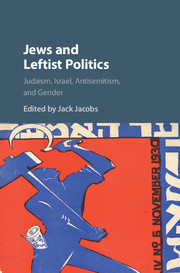Book contents
- Frontmatter
- Contents
- List of Contributors
- Acknowledgments
- Introduction
- PART ONE POLITICAL IMPLICATIONS OF JUDAISM
- PART TWO ANTISEMITISM AND THE LEFT
- PART THREE ISRAEL, ZIONISM, AND THE LEFT
- PART FOUR JEWS AND COMMUNISM
- PART FIVE GENDERED PERSPECTIVES
- PART SIX CANONICAL FIGURES
- PART SEVEN CASE STUDIES
- 15 The Soviet Union, Jewish Concerns, and the New York Electoral Left, 1939-1944
- 16 Jews and the Left at the New School
- 17 Deutscher and the Jews: On the Non-Jewish Jew - An Analysis and Personal Reflection
- Glossary
- Index
16 - Jews and the Left at the New School
from PART SEVEN - CASE STUDIES
Published online by Cambridge University Press: 13 April 2017
- Frontmatter
- Contents
- List of Contributors
- Acknowledgments
- Introduction
- PART ONE POLITICAL IMPLICATIONS OF JUDAISM
- PART TWO ANTISEMITISM AND THE LEFT
- PART THREE ISRAEL, ZIONISM, AND THE LEFT
- PART FOUR JEWS AND COMMUNISM
- PART FIVE GENDERED PERSPECTIVES
- PART SIX CANONICAL FIGURES
- PART SEVEN CASE STUDIES
- 15 The Soviet Union, Jewish Concerns, and the New York Electoral Left, 1939-1944
- 16 Jews and the Left at the New School
- 17 Deutscher and the Jews: On the Non-Jewish Jew - An Analysis and Personal Reflection
- Glossary
- Index
Summary
In his article for this volume Michael Walzer challenges the widely held assumption that Jews inherited a cultural affinity for leftist politics through the teachings of traditional Judaism. He persuasively demonstrates the weakness of the assertion while acknowledging its enduring popularity among Jews who identify with progressive causes – he embraced the idea himself until very recently; so did I. We have all heard variations on the theme, usually from people who describe themselves as “cultural” Jews, as opposed to religious Jews, but also from those who have tried to change traditional Judaism in ways that would accommodate their political views on, for example, the rights of women.
We also hear people making similar remarks about the presence of a relatively large number of Jews in progressive academic institutions, such as the New School for Social Research. Founded in the name of academic freedom, only two years after the Russian Revolution, the New School has had a reputation since 1919 of being a haven for leftist intellectuals and artists. After it created the University in Exile in 1933, it earned a reputation as a haven for Jewish leftists in particular.
As we shall see, the story is a good deal more complicated. Although the New School has heroically championed progressive causes since 1919, it has never embraced a leftist agenda. On the contrary, it openly opposed the Communist Party at a time when taking a stand against the Soviet Union branded you a reactionary among many in leftist circles. What is more, despite having founded the University in Exile that welcomed Jewish refugees from Nazi-occupied Europe, it has never seen itself as a Jewish institution. Jews may have taught at the New School in significant numbers when other universities in the country were excluding them, but the Jews at the New School did not identify themselves as Jewish intellectuals. With very few exceptions they saw little connection between their academic and political interests and whatever ancestral ties they might still have had to traditional Judaism.
Before turning to the history of the New School, let me give a specific example of how people have seen – and continue to see – a logical connection between the teachings of traditional Judaism and the choices Jews have made to act politically in the name of progressive causes.
- Type
- Chapter
- Information
- Jews and Leftist PoliticsJudaism, Israel, Antisemitism, and Gender, pp. 312 - 330Publisher: Cambridge University PressPrint publication year: 2017



